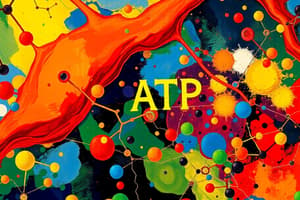Podcast
Questions and Answers
In which pathway does NAD act as a hydrogen acceptor?
In which pathway does NAD act as a hydrogen acceptor?
- EM pathway (correct)
- Glycolysis
- Pentose Phosphate Pathway
- HMP pathway
What is formed in the EM pathway?
What is formed in the EM pathway?
- CO2 but not ATP
- Neither CO2 nor ATP
- ATP but not CO2 (correct)
- CO2 and ATP
How many molecules of NADPH are formed per molecule of glucose 6-phosphate?
How many molecules of NADPH are formed per molecule of glucose 6-phosphate?
- Three
- One
- Four
- Two (correct)
In which pathway is ATP required but not produced?
In which pathway is ATP required but not produced?
What is the product of the second dehydrogenation reaction in the Pentose Phosphate Pathway?
What is the product of the second dehydrogenation reaction in the Pentose Phosphate Pathway?
What is the product of the oxidative reactions of the pentose phosphate pathway?
What is the product of the oxidative reactions of the pentose phosphate pathway?
What is the function of the stage 2 nonoxidative reactions of the pentose phosphate pathway?
What is the function of the stage 2 nonoxidative reactions of the pentose phosphate pathway?
What is the reactant of the enzyme phosphogluconate dehydrogenase?
What is the reactant of the enzyme phosphogluconate dehydrogenase?
What percentage of glucose is shunted through the pentose phosphate pathway daily?
What percentage of glucose is shunted through the pentose phosphate pathway daily?
What is the primary location of the pentose phosphate pathway?
What is the primary location of the pentose phosphate pathway?
What is the primary purpose of the pentose phosphate pathway?
What is the primary purpose of the pentose phosphate pathway?
How many molecules of glucose-6-phosphate enter the pentose phosphate pathway?
How many molecules of glucose-6-phosphate enter the pentose phosphate pathway?
What is the byproduct of the pentose phosphate pathway that is used for nucleotide synthesis?
What is the byproduct of the pentose phosphate pathway that is used for nucleotide synthesis?
What is the role of NADPH in hemoglobin?
What is the role of NADPH in hemoglobin?
What is the consequence of diminished G6PD activity in cells?
What is the consequence of diminished G6PD activity in cells?
What is the primary function of NADPH in the lens of the eye?
What is the primary function of NADPH in the lens of the eye?
What is the result of the inability to detoxify oxidizing agents in G6PD deficiency?
What is the result of the inability to detoxify oxidizing agents in G6PD deficiency?
What is the role of NADPH in macrophage activity?
What is the role of NADPH in macrophage activity?
In which organs is the oxidative reaction of the pentose phosphate pathway active?
In which organs is the oxidative reaction of the pentose phosphate pathway active?
What is the role of NADPH in erythrocytes?
What is the role of NADPH in erythrocytes?
What is the function of NADPH in the nonoxidative reactions of the pentose phosphate pathway?
What is the function of NADPH in the nonoxidative reactions of the pentose phosphate pathway?
Which organs require NADPH for the biosynthesis of fatty acids and steroids?
Which organs require NADPH for the biosynthesis of fatty acids and steroids?
What is the role of NADPH in free radical scavenging?
What is the role of NADPH in free radical scavenging?
In which organs is the pentose phosphate pathway involved in nucleotide synthesis?
In which organs is the pentose phosphate pathway involved in nucleotide synthesis?
What is the role of NADPH in the adrenal cortex?
What is the role of NADPH in the adrenal cortex?
What is the role of glutathione in erythrocytes?
What is the role of glutathione in erythrocytes?
In which organs is the pentose phosphate pathway involved in fatty acid synthesis?
In which organs is the pentose phosphate pathway involved in fatty acid synthesis?
Study Notes
Prevention of Methemoglobinemia
- NADPH is essential for keeping hemoglobin iron in a reduced state (ferrous) to prevent methemoglobinemia, which impairs oxygen transport.
Role of NADPH in Eye Health
- NADPH maintains lens transparency by supporting lens protein health.
Macrophage Function
- NADPH enables macrophages to produce superoxide anion radicals, crucial for bacterial elimination.
Clinical Significance of HMP Pathway
- Glucose 6-phosphate dehydrogenase (G6PD) deficiency is the most common enzyme deficiency, inherited in an X-linked manner.
- It leads to hemolytic anemia due to an inability to detoxify oxidizing agents.
- Reduced G6PD activity decreases NADPH formation, impairing cellular detoxification of free radicals and peroxides.
- Symptoms of G6PD deficiency include anemia, jaundice, and dark urine.
Key Differences Between Pathways
-
Embden-Meyerhof Pathway (Glycolysis)
- Occurs in all tissues.
- NAD is the hydrogen acceptor and ATP is both required and produced.
- CO2 is not formed.
-
Hexose Monophosphate Shunt (HMP) Pathway
- Occurs in specialized tissues for specific functions.
- NADP is the hydrogen acceptor; ATP is required but not produced.
- CO2 is produced.
Reactions in Pentose Phosphate Pathway
-
Stage 1: Oxidative Reactions (Irreversible)
- Involve dehydrogenation of glucose 6-phosphate, hydration of phosphogluconolactone, and formation of ribulose 5-phosphate.
- Each cycle converts glucose 6-phosphate to ribulose 5-phosphate, CO2, and two NADPH molecules.
-
Stage 2: Nonoxidative Reactions (Reversible)
- Ribulose 5-phosphate can be converted into ribose 5-phosphate for nucleotide synthesis or intermediates of glycolysis (fructose 6-phosphate, glyceraldehyde 3-phosphate).
Definition and Significance of the HMP Pathway
- Known as the pentose phosphate pathway; serves as an alternative route for glucose oxidation.
- Approximately 10% of daily glucose is diverted to this pathway, occurring in the cytosol.
- Major objectives include generating NADPH for biochemical reduction and pentose phosphates for nucleotide synthesis.
- Each cycle processes three glucose-6-phosphates, yielding CO2 and five-carbon residues generating glucose 6-phosphate and glyceraldehyde 3-phosphate.
Physiological Significance of the HMP Pathway
- Oxidative reactions occur primarily in:
- Liver
- Lactating mammary glands
- Adipose tissue (fatty acid biosynthesis)
- Adrenal cortex (steroid synthesis)
- Erythrocytes (glutathione reduction)
- Testes and ovaries
- Lens of eyes
- Nonoxidative reactions happen in all cell types for synthesizing nucleotides and nucleic acids.
Functions of NADPH
- Provides reducing equivalents to support biosynthesis of fatty acids, cholesterol, and steroids.
- Aids in free radical scavenging, enhancing regeneration of reduced glutathione reductase to eliminate free radicals (like superoxide and hydrogen peroxide).
- Ensures erythrocyte membrane integrity by maintaining glutathione in a reduced state, detoxifying free radicals within red blood cells.
Studying That Suits You
Use AI to generate personalized quizzes and flashcards to suit your learning preferences.
Description
Test your knowledge on the Embden-Meyerhof-Parnas pathway and the Hexose Monophosphate Shunt pathway. Identify the key differences between these two pathways, including the tissues in which they occur, the acceptors of hydrogen, and the production of ATP and CO2.




